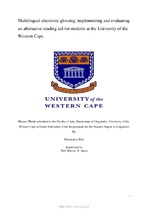Multilingual electronic glossing: Implementing and evaluating an alternative reading aid for students at the University of the Western Cape
Abstract
Vocabulary knowledge is an indicator of language competence. There is a positive
relationship between literacy levels and the medium of instruction. Research has shown that
reading comprehension is largely dependent on the reader’s vocabulary knowledge in the
language in which the text is written (Kieffer & Lesaux, 2007; Nation, 2001; Sutarsyah,
Nation, and Kennedy, 1994). The lack of vocabulary knowledge is normally one of the major
challenges for many university students struggling with their academic work, especially those
for whom the language of tuition is not a first language. African (and Afrikaans mothertongue)
students are unable to access information in their home languages because of the lack
of terminology and texts in African languages (Edward and Ngwaru, 2011). There is research
in South Africa showing that vocabulary is a challenge for university students, especially at
first-year level (Butler & van Dyk, 2004, Manik, 2015: 236, Nkomo & Madiba, 2011).
Vocabulary, being such a problem, ultimately affects the academic performance of many
students.
Although some universities have provided multilingual online glossaries (and other
resources) in an effort to accommodate multilingual students struggling with comprehension
in the medium of instruction, these modes of delivering glossaries are associated with a few
problems. Consulting traditional glossaries/dictionaries disrupts the reading process and
affects the flow of ideas. It is also possible that the reader will forget the term in question (or
its context) right after consulting the dictionary/glossary, therefore readers have to look-up
the same term in the dictionary/glossary several times to ensure that they match it with its
definition accurately. In some dictionaries/glossary lists, readers will not find the desired
term, or the term they find will not provide an adequate definition – which ends up frustrating
the reader. Sometimes the list of definitions for one term that readers find in
dictionaries/glossary lists is difficult to comprehend. Instead of providing clarity, the
definitions can confuse readers even further. The comprehension of some definitions
provided in dictionaries/glossary lists depend on prior understanding of several other terms.

